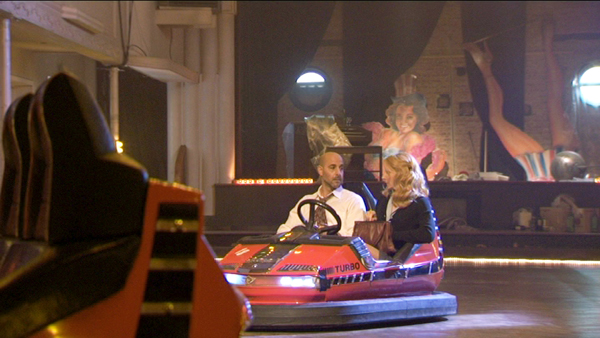|
Reviews of Recent Independent, Foreign, & Documentary Films in Theaters and DVD/Home Video

BLIND DATE The shooting and stabbing death of the provocative filmmaker Theo Van Gogh by an Islamic extremist in 2004 sparked enormous controversy around the world about the role of free artistic expression versus religious extremism. (He had made a film, Submission, about the role of women in Islam that was criticized as anti-Islamic.) It also created a movement to remake three of his films in English. The first, Interview, starring Steve Buscemi and Sienna Miller, was a tight, focused duel of words between a soap opera actress and a reporter. The second, Blind Date, directed and adapted by Stanley Tucci, takes a close look at a relationship that may be damaged beyond repair. Every week either Don (Tucci) or Janna (Patricia Clarkson) places a personal ad in the newspaper. Every week they go on a blind date while pretending to be different people, always meeting in the same bar under the watchful eye of the same waiter (Dutch star Thijs Römer). But with their daughter’s death haunting every word they speak, their attempts are more exercises in masochism than any move toward redemption. “The death of a child,” says the film’s young narrator, “is said to be one of the worst tragedies that can be endured.” For Don and Janna, this observation is an understatement. Tucci’s direction is restrained, with shots wandering around the bar as if in search of an escape it cannot find. Filmed on location in Belgium, the space has an old-world charm that in other circumstances would be considered romantic. Under Tucci’s influence, it becomes the sad leftover of a world gone by, as lonely and foreboding as a deserted carnival ground. As the camera lingers over and over and over on furniture and windows, a sense of claustrophobia spreads. As Don and Janna refuse to move on from their grief, so too, does the film. As a
result, the movie sags under the weight of its subject, with whatever
momentum it may have dying in the middle. The pleasure of watching
Clarkson and Tucci sparring under different identities slowly fades as
their characters struggle to overcome their pain. The more disheveled
Tucci becomes, the more weariness creeps into Clarkson’s eyes. We never
truly see Don and Janna, only the sparks of personality they allow to
shine through on their “dates.” Even these lights sputter and die in the
face of their tragedy. By the end of the film, Tucci and Clarkson are
going through the motions. Then again, so are Don and Janna. And for
people, as well as for some films, the motions aren’t enough.
Lisa Bernier
|

